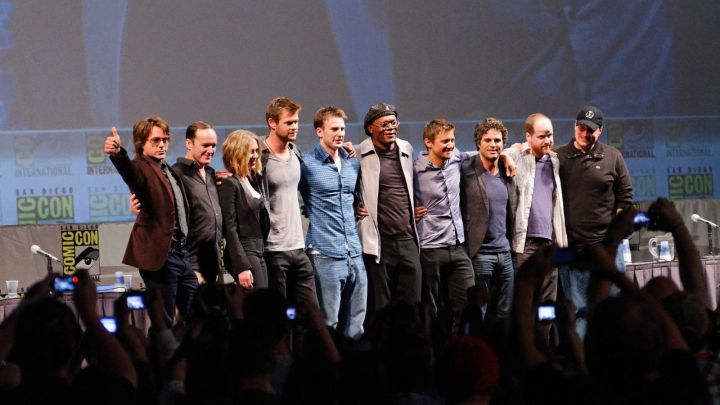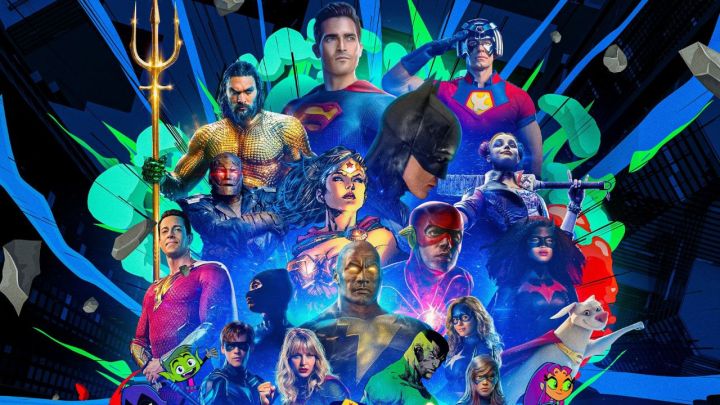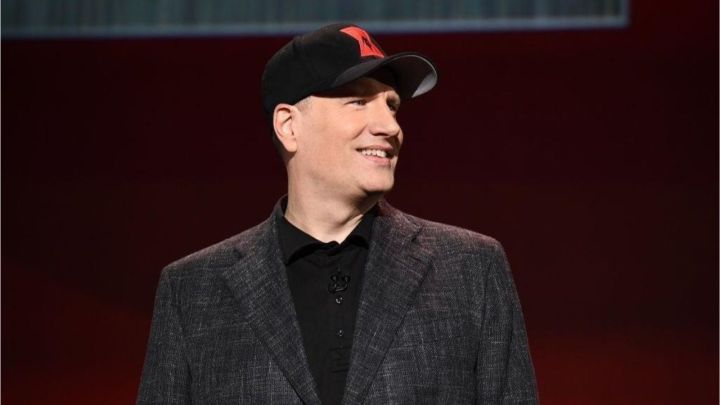
The place? Hall H at the San Diego Comic-Con. The time? 2019, almost a full year before the COVID-19 pandemic hit us like a truck and changed our lives forever. The surprise? Kevin Feige and a stage full of superstars, including A-listers, Oscar winners and nominees, and everything in between, gathered for a photo after the Marvel honcho revealed the entire slate of Phase 4 projects following the massive success of Avengers: Endgame.
Everyone was there, and every reveal felt like a promise: Doctor Strange and Wanda teaming up for a multiversal adventure; Wanda and Vision starring in a Disney+ show, hinting at a potential House of M adaptation; Loki finally getting a solo project. But that wasn’t all. Eternals! Shang-Chi! Female freaking Thor! By the time Feige revealed Mahershala Ali would play Blade, the entirety of Hall H had melted into a pool of sheer ecstasy.
Now, two years later, we have seen most of those projects, and the finished results were mostly disappointing, give or take a WandaVision; the story, however, was different back then. The reveals felt massive, and learning about them in real-time felt special as if we were witnessing pop culture history in the making. Not everyone was personally at Hall H, but news travels fast in a modernized world, and each breaking story confirmed something we had known for years: San Diego Comic-Con was the place to be.
For the love of the art

The now-iconic picture of the Phase 4 team posing together perfectly summarizes what Comic-Con once meant to the pop culture landscape. It was the event by excellence, the place where big things happened, announced by even bigger names. “Nerd” culture thrived, creativity reigned, and fantasy ran rampant. Comic books and superheroes were the cool kids, but there was room for everyone, and everyone was invited. Expected shows like Game of Thrones and The Big Bang Theory were staples at the event, while wildcards like Riverdale and The Good Place also found themselves in the mix.
Above all, Comic-Con was a place of genuine camaraderie, where people who loved pop culture met to share, laugh, and celebrate everything that might otherwise seem geeky. Comic-Con had a deep appreciation for the artist and the art; it was the place where comic artist Bruno Redondo was as well-known and celebrated as Dwayne Johnson. Comic-Con was a true celebration, the place where fantasy, sci-fi, mystery, and adventure clashed and partied together, drinking from the same bottle of Romulan ale.
Comic-Con was the most important event for nerd culture, but there was nothing lame about it. Comic-Con was the coolest thing to happen in San Diego over the summer, the place where Tom Hiddleston came out in full Loki costume and Harrison Ford and Carrie Fisher shared a tender kiss. It’s where Bryan Cranston showed up wearing a Walter White mask, which he then took off and made out with, something his co-star, Aaron Paul, also did. It’s where the Avengers assembled for the first time. Comic-Con was where fantasies became realities and dreams came true.
To be at Comic-Con was to be a big freaking deal. The convention was chaotic and wild, an explosion of escapism and imagination and an open invitation to sink into the depths of our inner geek. Thor and Mister Spock chatted in the snack line while the Fourth Doctor and Sailor Moon took pictures together. Hell, it was the place where Henry Cavill wore a Guy Fawkes mask and walked around unrecognized. Everything was possible at Comic-Con.
The creativity and thrills offered by the convention opened the door for fans to let their imaginations fly. Cosplaying was vital to Comic-Con, engrained in its very DNA. Over the years, the convention has given us some of the most creative and daring examples of cosplaying ever; it’s not Comic-Con unless you do it right, and fans from all over the world went out of their way to do it right. The main floor at San Diego Comic-Con might’ve seemed like madness to the uninitiated, but it was like a fulfilled dream for fans.
A world without the Con

The COVID-19 pandemic changed our world forever. Hollywood felt the shake-up, and, aside from the business it lost by seeing movie theaters close, it also saw many of its landmark events slip away, among them Comic-Con. The event that had been a pop culture staple for over 50 years was suddenly stopped in its tracks, stifled by a worldwide pandemic that showed no signs of ending.
True to its need to market its latest offerings, Hollywood looked for other options. There had always been other conventions — Disney had D-23 and its investor day, and at least two other major gatherings were already operating under the Comic-Con title. COVID prevented those too. Suddenly, Hollywood needed to do something it famously dislikes: thinking outside the box. Searching for alternatives to compensate for the loss of such a crucial event, the movie business explored digital options, and studios had to get really creative really fast.
Warner Bros. came up with DC FanDome, a mostly successful event that couldn’t help but feel blatantly small-scale compared to the heights of the once mighty Comic-Con. Disney/Marvel kept its major announcements for its bizarrely anti-climactic investor day and made full use of the trades, sending blasts via The Hollywood Reporter, Variety, and many of the usual suspects. Most did hefty business on Twitter, trending and succeeding in generating word of mouth. However, none achieved the same level of attention or provoked the same excitement that they would’ve had they been announced on the Hall H stage. So, while the Comic-Con announcement of a Werewolf by Night Halloween Special might’ve prompted fans to learn more about the character, the project’s reveal via Twitter was more of a fizzle than a bang.
Hollywood had always known about the importance of Comic-Con to its proper functioning, but COVID further put things into perspective. Comic-Con wasn’t just a fun gathering where fans came to live out their pop culture fantasies but a massive publicity tool that did half the work in selling any given project. And while the obvious solution might’ve seemed to create new and specific conventions for every major studio, the reality proved more complicated. The truth is, San Diego Comic-Con is the clash of multiple fandoms and, hard as it may be to believe, not everyone is in love with superhero content. So while Trekkies and Potterheads might’ve been compelled to learn more about Marvel’s newest adventure because of the rumblings coming out of Hall H, they wouldn’t even know about the reveal if it happened at an event exclusively dedicated to superheroes.
Just because DC organizes a convention doesn’t mean everyone will want to attend. Warner Bros. learned that the hard way.
Back for round two

2022 will mark the return of the San Diego Comic-Con, but the world is completely different from when the event last happened two years ago. However, studios came to play; after all, a lot is riding on the success of Comic-Con 2022, and Hollywood is not one to go down without a fight.
Marvel elicited cheers when it announced it would return to Hall H, bringing along a slate of projects waiting for their chance to take the stage and shock audiences once more. Black Panther: Wakanda Forever will most likely be the studio’s centerpiece — it’s supposedly three months away, and we still have nothing, not even a measly poster. Ant-Man and the Wasp: Quantumania, Guardians of the Galaxy Vol. 3, and the multitude of upcoming Disney+ shows might also receive their fair share of attention. We know Kevin Feige is a showman at heart, and he won’t waste the chance to be the star of the first post-pandemic Comic-Con. The event is where some of the best superhero movies first saw the light, and Marvel will make sure to keep that tradition alive.
Shockingly, DC kept things simple by only inviting two major properties to the party, Black Adam and Shazam: Fury of the Gods. Netflix, HBO, Disney, Paramount, and Amazon will also bring out their biggest guns, hoping to leave their mark on the event. Even Adult Swim, bless their hearts, is coming to play. They all know what’s at stake here and what will happen if this Comic-Con fails. Because Hollywood can’t let Comic-Con fail, the last two years proved that it is crucial for the blockbuster business’ existence. Hollywood isn’t Hollywood unless it has something to promote, and a good sales pitch involves the right stage and paraphernalia. From a business perspective, that’s what San Diego Comic-Con is.
But what about us, the fans who love Comic-Con because of its sense of community? That’s the marvelous thing about the convention; we give it meaning; we turn it into a celebration of pop culture; we make it the place where we can be geeks and proud of it. We will wear the costumes and attend the panels, but mostly, we will celebrate the chance to be there again, surrounded by people who feel the same as us; we might not know them, but they are not strangers. We are all part of the same community, and going back will feel like the first day after a long, George R. R. Martin-type of summer.
So, San Diego, I hope you’re up cause we are all coming over. Comic-Con is back, and we’ll make it better than ever.



